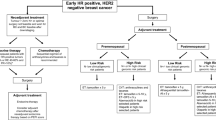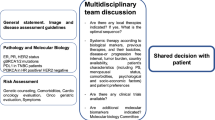Abstract
Purpose
Increased body mass index (BMI) and metabolic syndrome (MS) are associated with increased breast cancer recurrence risk. Whether this is due to intrinsic tumor biology or modifiable factors of the obese state remains incompletely understood.
Methods
Oncotype DX Recurrence Scores of 751 patients were stratified by BMI to assess association with tumor-intrinsic recurrence risk. Cellular proliferation by Ki67 after 10–21 days of presurgical letrozole treatment was used to stratify endocrine therapy response (sensitive—ln(Ki67) < 1; intermediate—ln(Ki67)1–2; resistant—ln(Ki67) > = 2). BMI at the time of surgery and MS variables were collected retrospectively for 143 patients to analyze association between therapy response and BMI/MS. Additionally, PI3K pathway signaling was evaluated by immunohistochemistry of phosphorylated Akt and S6.
Results
There was no significant association between BMI and recurrence score (p = 0.99), and risk score distribution was similar across BMI groups. However, BMI was associated with short-term endocrine therapy resistance, with a significant enrichment of intermediate and resistant tumors in patients with obesity (55%, p = 0.0392). Similarly, the relative risk of an endocrine therapy-resistant tumor was 1.4-fold greater for patients with MS (p = 0.0197). In evaluating PI3K pathway mediators, we found patients with 3 or more MS criteria had more tumors with pAkt scores above the median (p = 0.0436). There were no significant differences in S6 activation.
Conclusion
Our findings suggest the association between obesity/metabolic syndrome and breast cancer recurrence is better reflected by response to treatment than tumor-intrinsic properties, suggesting interventions to reverse obesity and/or MS may improve outcomes for breast cancer recurrence.





Similar content being viewed by others
Data availability
The datasets generated during and/or analyzed during the current study are not publicly available due to patient confidentiality but are available from the corresponding author on reasonable request.
References
Ligibel JA, Alfano CM, Courneya KS, Demark-Wahnefried W, Burger RA, Chlebowski RT, Fabian CJ, Gucalp A, Hershman DL, Hudson MM, Jones LW, Kakarala M, Ness KK, Merrill JK, Wollins DS, Hudis CA (2014) American society of clinical oncology position statement on obesity and cancer. J Clin Oncol 32:3568–3574. https://doi.org/10.1200/jco.2014.58.4680
Ward ZJ, Bleich SN, Cradock AL, Barrett JL, Giles CM, Flax C, Long MW, Gortmaker SL (2019) Projected U.S. state-level prevalence of adult obesity and severe obesity. N Engl J Med 381:2440–2450. https://doi.org/10.1056/NEJMsa1909301
Chan DSM, Vieira AR, Aune D, Bandera EV, Greenwood DC, McTiernan A, Navarro Rosenblatt D, Thune I, Vieira R, Norat T (2014) Body mass index and survival in women with breast cancer-systematic literature review and meta-analysis of 82 follow-up studies. Ann Oncol 25:1901–1914. https://doi.org/10.1093/annonc/mdu042
Protani M, Coory M, Martin JH (2010) Effect of obesity on survival of women with breast cancer: systematic review and meta-analysis. Breast Cancer Res Treat 123:627–635. https://doi.org/10.1007/s10549-010-0990-0
Early Breast Cancer Trialists’ Collaborative Group EBCTCG, Peto R, Davies C, Godwin J, Gray R, Pan HC, Clarke M, Cutter D, Darby S, McGale P, Taylor C, Wang YC, Bergh J, Di Leo A, Albain K, Swain S, Piccart M, Pritchard K (2012) Comparisons between different polychemotherapy regimens for early breast cancer: meta-analyses of long-term outcome among 100,000 women in 123 randomised trials. Lancet 379:432–444. https://doi.org/10.1016/S0140-6736(11)61625-5
Goodwin PJ, Stambolic V (2015) Impact of the obesity epidemic on cancer. Annu Rev Med 66:281–296. https://doi.org/10.1146/annurev-med-051613-012328
Berrino F, Villarini A, Traina A, Bonanni B, Panico S, Mano MP, Mercandino A, Galasso R, Barbero M, Simeoni M, Bassi MC, Consolaro E, Johansson H, Zarcone M, Bruno E, Gargano G, Venturelli E, Pasanisi P (2014) Metabolic syndrome and breast cancer prognosis. Breast Cancer Res Treat 147:159–165. https://doi.org/10.1007/s10549-014-3076-6
Calip GS, Malone KE, Gralow JR, Stergachis A, Hubbard RA, Boudreau DM (2014) Metabolic syndrome and outcomes following early-stage breast cancer. Breast Cancer Res Treat 148:363–377. https://doi.org/10.1007/s10549-014-3157-6
Cancer GAN (2012) Comprehensive molecular portraits of human breast tumours. Nature 490:61–70. https://doi.org/10.1038/nature11412
Miller TW, Hennessy BT, González-Angulo AM, Fox EM, Mills GB, Chen H, Higham C, García-Echeverría C, Shyr Y, Arteaga CL (2010) Hyperactivation of phosphatidylinositol-3 kinase promotes escape from hormone dependence in estrogen receptor–positive human breast cancer. J Clin Investig 120:2406–2413. https://doi.org/10.1172/jci41680
Law JH, Habibi G, Hu K, Masoudi H, Wang MY, Stratford AL, Park E, Gee JM, Finlay P, Jones HE, Nicholson RI, Carboni J, Gottardis M, Pollak M, Dunn SE (2008) Phosphorylated insulin-like growth factor-i/insulin receptor is present in all breast cancer subtypes and is related to poor survival. Cancer Res 68:10238–10246. https://doi.org/10.1158/0008-5472.CAN-08-2755
Paik S, Shak S, Tang G, Kim C, Baker J, Cronin M, Baehner FL, Walker MG, Watson D, Park T, Hiller W, Fisher ER, Wickerham DL, Bryant J, Wolmark N (2004) A multigene assay to predict recurrence of tamoxifen-treated, node-negative breast cancer. N Engl J Med 351:2817–2826. https://doi.org/10.1056/NEJMoa041588
Paik S, Tang G, Shak S, Kim C, Baker J, Kim W, Cronin M, Baehner FL, Watson D, Bryant J, Costantino JP, Geyer CE, Wickerham DL, Wolmark N (2006) Gene expression and benefit of chemotherapy in women with node-negative, estrogen receptor-positive breast cancer. J Clin Oncol 24:3726–3734. https://doi.org/10.1200/jco.2005.04.7985
Kalinsky K, Barlow WE, Gralow JR et al (2021) 21-Gene assay to inform chemotherapy benefit in node-positive breast cancer. N Engl J Med 385:2336–2347. https://doi.org/10.1056/nejmoa2108873
Sparano JA, Gray RJ, Makower DF et al (2015) Prospective validation of a 21-gene expression assay in breast cancer. N Engl J Med 373:2005–2014. https://doi.org/10.1056/NEJMoa1510764
Sparano JA, Gray RJ, Makower DF, Pritchard KI, Albain KS, Hayes DF, Geyer CE, Dees EC, Goetz MP, Olson JA, Lively T, Badve SS, Saphner TJ, Wagner LI, Whelan TJ, Ellis MJ, Paik S, Wood WC, Ravdin PM, Keane MM, Gomez Moreno HL, Reddy PS, Goggins TF, Mayer IA, Brufsky AM, Toppmeyer DL, Kaklamani VG, Berenberg JL, Abrams J, Sledge GW (2018) Adjuvant chemotherapy guided by a 21-gene expression assay in breast cancer. N Engl J Med 379:111–121. https://doi.org/10.1056/nejmoa1804710
Dowsett M, Smith IE, Ebbs SR, Dixon JM, Skene A, Griffith C, Boeddinghaus I, Salter J, Detre S, Hills M, Ashley S, Francis S, Walsh G, IMPACT T, (2005) Short-term changes in Ki-67 during neoadjuvant treatment of primary breast cancer with anastrozole or tamoxifen alone or combined correlate with recurrence-free survival. Clin Cancer Res 11:951s-s958
Dowsett M, Smith IE, Ebbs SR, Dixon JM, Skene A, A’Hern R, Salter J, Detre S, Hills M, Walsh G (2007) Prognostic value of Ki67 expression after short-term presurgical endocrine therapy for primary breast cancer. J Natl Cancer Instit 99:167–170. https://doi.org/10.1093/jnci/djk020
Ellis MJ, Ma C (2007) Letrozole in the neoadjuvant setting: the P024 trial. Breast Cancer Res Treat 105:33–43. https://doi.org/10.1007/s10549-007-9701-x
Dowsett M, Ebbs SR, Dixon JM, Skene A, Griffith C, Boeddinghaus I, Salter J, Detre S, Hills M, Ashley S, Francis S, Walsh G, Smith IE (2005) Biomarker changes during neoadjuvant anastrozole, tamoxifen, or the combination: influence of hormonal status and HER-2 in breast cancer–a study from the IMPACT trialists. J Clin Oncol 23:2477–2492. https://doi.org/10.1200/JCO.2005.07.559
Goncalves R, Reinert T, Ellis MJ (2017) Avoidance of negative results in adjuvant endocrine therapy trials for estrogen receptor-positive breast cancer. J Clin Oncol 35:2718–2719. https://doi.org/10.1200/JCO.2017.73.0424
Giltnane JM, Hutchinson KE, Stricker TP et al (2017) Genomic profiling of ER + breast cancers after short-term estrogen suppression reveals alterations associated with endocrine resistance. Sci Translational Med. https://doi.org/10.1126/scitranslmed.aai7993
Muniz J, Kidwell KM, Henry NL (2016) Associations between metabolic syndrome, breast cancer recurrence, and the 21-gene recurrence score assay. Breast Cancer Res Treat 157:597–603. https://doi.org/10.1007/s10549-016-3846-4
Sestak I, Dowsett M, Ferree S, Baehner FL, Cuzick J (2016) Retrospective analysis of molecular scores for the prediction of distant recurrence according to baseline risk factors. Breast Cancer Res Treat 159:71–78. https://doi.org/10.1007/s10549-016-3868-y
Kwan ML, Kroenke CH, Sweeney C, Bernard PS, Weltzien EK, Castillo A, Factor RE, Maxfield KS, Stijleman IJ, Kushi LH, Quesenberry CP, Habel LA, Caan BJ (2015) Association of high obesity with PAM50 breast cancer intrinsic subtypes and gene expression. BMC Cancer. https://doi.org/10.1186/s12885-015-1263-4
Chlebowski RT, Aragaki AK, Anderson GL, Pan K, Neuhouser ML, Manson JE, Thomson CA, Mossavar-Rahmani Y, Lane DS, Johnson KC, Wactawski-Wende J, Snetselaar L, Rohan TE, Luo J, Barac A, Prentice RL, Women’s HI, (2020) Dietary modification and breast cancer mortality: long-term follow-up of the women’s health initiative randomized trial. J Clin Oncol 38:1419–1428. https://doi.org/10.1200/JCO.19.00435
Huang JL, Kizy S, Marmor S, Altman A, Blaes A, Beckwith H, Tuttle TM, Hui JYC (2018) Tumor grade and progesterone receptor status predict 21-gene recurrence score in early stage invasive breast carcinoma. Breast Cancer Res Treat 172:671–677. https://doi.org/10.1007/s10549-018-4955-z
Ewertz M, Jensen M-B, Gunnarsdóttir KÁ, Højris I, Jakobsen EH, Nielsen D, Stenbygaard LE, Tange UB, Cold S (2011) Effect of obesity on prognosis after early-stage breast cancer. J Clin Oncol 29:25–31. https://doi.org/10.1200/jco.2010.29.7614
Sestak I, Distler W, Forbes JF, Dowsett M, Howell A, Cuzick J (2010) Effect of body mass index on recurrences in Tamoxifen and Anastrozole treated women: an exploratory analysis from the ATAC trial. J Clin Oncol 28:3411–3415. https://doi.org/10.1200/jco.2009.27.2021
Gnant M, Pfeiler G, Stöger H, Mlineritsch B, Fitzal F, Balic M, Kwasny W, Seifert M, Stierer M, Dubsky P, Greil R, Steger G, Samonigg H, Fesl C, Jakesz R (2013) The predictive impact of body mass index on the efficacy of extended adjuvant endocrine treatment with anastrozole in postmenopausal patients with breast cancer: an analysis of the randomised ABCSG-6a trial. Br J Cancer 109:589–596. https://doi.org/10.1038/bjc.2013.367
Pfeiler G, Königsberg R, Fesl C, Mlineritsch B, Stoeger H, Singer CF, Pöstlberger S, Steger GG, Seifert M, Dubsky P, Taucher S, Samonigg H, Bjelic-Radisic V, Greil R, Marth C, Gnant M (2011) Impact of body mass index on the efficacy of endocrine therapy in premenopausal patients with breast cancer: an analysis of the prospective ABCSG-12 trial. J Clin Oncol 29:2653–2659. https://doi.org/10.1200/jco.2010.33.2585
Chlebowski RT, Reeves MM (2016) Weight loss randomized intervention trials in female cancer survivors. J Clin Oncol 34:4238–4248. https://doi.org/10.1200/jco.2016.69.4026
Ligibel JA, Barry WT, Alfano C, Hershman DL, Irwin M, Neuhouser M, Thomson CA, Delahanty L, Frank E, Spears P, Paskett ED, Hopkins J, Bernstein V, Stearns V, White J, Hahn O, Hudis C, Winer EP, Wadden TA, Goodwin PJ (2017) Randomized phase III trial evaluating the role of weight loss in adjuvant treatment of overweight and obese women with early breast cancer (Alliance A011401): study design. npj Breast Cancer. https://doi.org/10.1038/s41523-017-0040-8
Funding
This work was partially supported by National Institutes of Health grants NIGMS T32GM007347 (R.B.) and NCI SPORE P50CA098131-19 (V.S., M.E.S., P.G.-E., and B.N.R.).
Author information
Authors and Affiliations
Contributions
BNR: designed and initiated the retrospective study; CLA: designed and initiated the original clinical trial for Cohort 2. RB, YB, and BNR: clinical data collection and analysis were performed. VS, MES and PGE: Pathologic and molecular data collection and analysis were performed. BNR and RB: wrote the initial draft of the manuscript. All authors commented on previous versions of the manuscript and read and approved the final manuscript.
Corresponding author
Ethics declarations
Conflict of interests
The authors have no relevant financial or non-financial interests to disclose.
Ethical approval
This study was approved by the Vanderbilt University Medical Center Institution Review Board (IRB #191178).
Additional information
Publisher's Note
Springer Nature remains neutral with regard to jurisdictional claims in published maps and institutional affiliations.
Supplementary Information
Below is the link to the electronic supplementary material.
Rights and permissions
Springer Nature or its licensor (e.g. a society or other partner) holds exclusive rights to this article under a publishing agreement with the author(s) or other rightsholder(s); author self-archiving of the accepted manuscript version of this article is solely governed by the terms of such publishing agreement and applicable law.
About this article
Cite this article
Bergman, R., Berko, Y.A., Sanchez, V. et al. Obesity and metabolic syndrome are associated with short-term endocrine therapy resistance in early ER + breast cancer. Breast Cancer Res Treat 197, 307–317 (2023). https://doi.org/10.1007/s10549-022-06794-y
Received:
Accepted:
Published:
Issue Date:
DOI: https://doi.org/10.1007/s10549-022-06794-y




